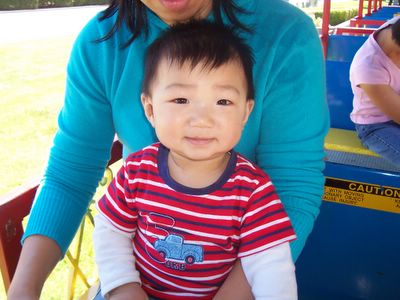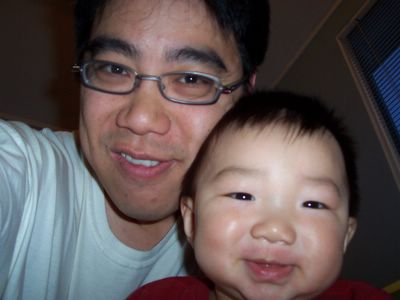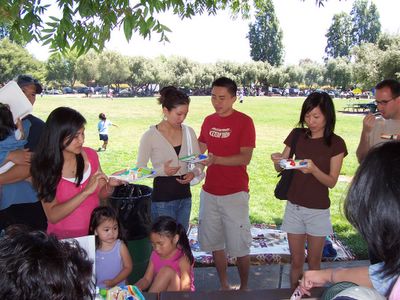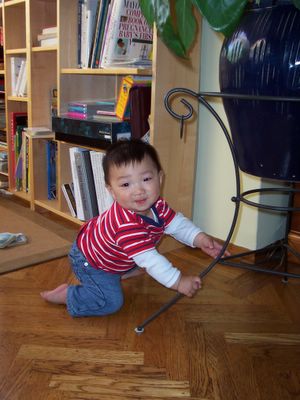While I can still read New York Times Op-Eds for free, I'm going to comment on them and savor the opportunities to point out how the economic policies of President George W. Bush and a Republican Congress can drive a liberal stark-raving mad. Paul Krugman's latest piece,
Losing Our Country, is a typical example of what we can expect from the New York Times.
With inflation in check, unemployment and interest rates low, a booming economy and the dollar on the rebound, there's not much economic news to complain about in the pages of the NY Times. Sure, there's always the growing trade and budget deficits that pessimists can bellow about, but these figures remain abstract concepts to most people. After all, if budget deficits have the supposed effect of
"crowding out private investment" (re: increasing borrowing costs), how does one explain to consumers today's record low interest rates? Likewise, conventional wisdom states that the unfavorable balance of trade should result in
high unemployment and low economic growth. Again, reality has outflanked conventional wisdom. Over the past decade, the US has the
fastest economic growth and lowest unemployment of the G8 nations.
Without facts and straight statistics to back up their assertions of economic malaise, Paul Krugman and the Times editors have chosen class warfare, usually referred to as "the growing gap between rich and poor" (henceforth known as 'GGBRP'), as their weapon of choice against Republican economic policy. Sprinkle in their personal observations as privileged white males growing up in the US, and you have the latest manufactured domestic crisis on the pages of the New York Times.
Krugman's latest is a real howler, and starts off with a ridiculous assertion:
Baby boomers like me grew up in a relatively equal society. In the 1960's America was a place in which very few people were extremely wealthy, many blue-collar workers earned wages that placed them comfortably in the middle class, and working families could expect steadily rising living standards and a reasonable degree of economic security.
But as The Times's series on class in America reminds us, that was another country. The middle-class society I grew up in no longer exists.
Need I remind Paul Krugman about the Lyndon Johnson's War on Poverty, a trillion-dollar 1960s welfare boondoggle that even Bill Clinton admitted was a failure? Did Martin Luther King Jr.' fight for minority civil rights take place during the 1960s or was I just dreaming? And what about women's rights? In the 1960s, it was still rare for women to own businesses or for women to be in the professions like law and medicine. Let's also not forget that abortion was illegal in every state at the time, something that I'm surprised got past the Times editorial review board. If Krugman's ideal world is 1960s America, then I would suggest that a young Paul Krugman spent too much time watching "Star Trek" and too little time reading the pages of his own New York Times.
It doesn't take long for Krugman to bring up the GGBRP. It starts, naturally, with a plug for "working families", implying that the rich in America don't actually work to earn their incomes:
Working families have seen little if any progress over the past 30 years. Adjusted for inflation, the income of the median family doubled between 1947 and 1973. But it rose only 22 percent from 1973 to 2003, and much of that gain was the result of wives' entering the paid labor force or working longer hours, not rising wages.
Meanwhile, economic security is a thing of the past: year-to-year fluctuations in the incomes of working families are far larger than they were a generation ago. All it takes is a bit of bad luck in employment or health to plunge a family that seems solidly middle-class into poverty.
But the wealthy have done very well indeed. Since 1973 the average income of the top 1 percent of Americans has doubled, and the income of the top 0.1 percent has tripled.
Why is this happening? I'll have more to say on that another day, but for now let me just point out that middle-class America didn't emerge by accident. It was created by what has been called the Great Compression of incomes that took place during World War II, and sustained for a generation by social norms that favored equality, strong labor unions and progressive taxation. Since the 1970's, all of those sustaining forces have lost their power.
Krugman's selection of the period from 1947-1973 as the heyday of "working families" is no accident. After World War 2 ended in 1945, the industrialized world, with the sole exception of the United States, was in ruins. We had a near monopoly on high-end industrial goods and services for nearly 30 years after the war, and couldn't help but succeed. This age of prosperity came to a halt during the recession of 1973-75 [how convenient!], and stagflation then took hold of the country until Ronald Reagan's economic policies reversed the economic slide in 1983-84. So establishing the year 1973 as the turning point of "working families" is just one example of Krugman's well-known obfuscation technique: the shaping, slicing and selectively presenting data in an attempt to mislead.
And let's not leave unchallenged Krugman's assertion that progressive taxation has lost [it's] powers since the 1970s. From
About.com:
In 2002 the latest year of available data, the top 5 percent of taxpayers paid more than one-half (53.8 percent) of all individual income taxes, but reported roughly one-third (30.6 percent) of income.
The top 1 percent of taxpayers paid 33.7 percent of all individual income taxes in 2002. This group of taxpayers has paid more than 30 percent of individual income taxes since 1995. Moreover, since 1990 this group’s tax share has grown faster than their income share.
Taxpayers who rank in the top 50 percent of taxpayers by income pay virtually all individual income taxes. In all years since 1990, taxpayers in this group have paid over 94 percent of all individual income taxes. In 2000, 2001, and 2002, this group paid over 96 percent of all individual income taxes. In 2000, 2001, and 2002, this group paid over 96 percent of the total.
Treasury Department analysts credit President Bush's tax cuts with shifting a larger share of the individual income taxes paid to higher income taxpayers. In 2005, says the Treasury, when most of the tax cut provisions are fully in effect (e.g., lower tax rates, the $1,000 child credit, marriage penalty relief), the projected tax share for lower-income taxpayers will fall, while the tax share for higher-income taxpayers will rise.
* The share of taxes paid by the bottom 50 percent of taxpayers will fall from 4.1 percent to 3.6 percent.
* The share of taxes paid by the top 1 percent of taxpayers will rise from 32.3 percent to 33.7 percent.
* The average tax rate for the bottom 50 percent of taxpayers falls by 27 percent as compared to a 13 percent decline for taxpayers in the top 1 percent.
The rest of Krugman's op-ed provides no data to support his accusations and is just a tirade against tax cuts and "right-wing partisans". To liberals like Krugman, the wealthy can only inherit their money or obtain it through fraudulent means. And a desire to keep most of one's earnings is just being greedy.
The partisans also rely in part on scare tactics, insisting that any attempt to limit inequality would undermine economic incentives and reduce all of us to shared misery. That claim ignores the fact of U.S. economic success after World War II. It also ignores the lesson we should have learned from recent corporate scandals: sometimes the prospect of great wealth for those who succeed provides an incentive not for high performance, but for fraud.
Above all, the partisans engage in name-calling. To suggest that sustaining programs like Social Security, which protects working Americans from economic risk, should have priority over tax cuts for the rich is to practice "class warfare." To show concern over the growing inequality is to engage in the "politics of envy."
But the real reasons to worry about the explosion of inequality since the 1970's have nothing to do with envy. The fact is that working families aren't sharing in the economy's growth, and face growing economic insecurity. And there's good reason to believe that a society in which most people can reasonably be considered middle class is a better society - and more likely to be a functioning democracy - than one in which there are great extremes of wealth and poverty.
Reversing the rise in inequality and economic insecurity won't be easy: the middle-class society we have lost emerged only after the country was shaken by depression and war. But we can make a start by calling attention to the politicians who systematically make things worse in catering to their contributors. Never mind that straw man, the politics of envy. Let's try to do something about the politics of greed.
Does Krugman provide any evidence that working families today are heading toward Middle Ages-like serfdom? Indeed, today's so-called downtrodden are better off than at anytime in American history. Virtually everyone at lower income levels now has access to material goods that just 20 years ago were the exclusive domain of the rich: cell phones, microwave ovens, computers [Dell's lowest priced computer is now $250!] VCRs and the like. And more people have access to college, health care and yes, air travel than at any time in our history [JetBlue offers coast-to-coast airfares as low as $99 each way]. Here's another question for Krugman and the Times editors: If everyone's income doubles during a given period, the income gap between the rich and the poor will double too. How do you explain this in terms of the GGBRP?
Finally, let me provide the clearest explanation on why the GGBRP doesn't matter. As a member of the upper-middle-class segment in the US (Top 5% in income), I really don't care how much money the rich in America (Top 1%) has or how they live. I care about how my family, friends and neighbors live. And yes, I do care about the poor in this country, because I've always believed that people need to take an active role in helping the needy. That the rich can
afford to buy fifty $130,000 Mercedes autos and
spends summer at their $15 million house on Nantucket really does not interest me in the least.
Some issues (but certainly not all) that matter to me include:
Do I have enough resources to provide for my family, and to retire comfortably without Social Security?
Are interest rates low so my mortgage payments aren't too high?
Is inflation eating into the value of my savings and investments?
Will my children be able to attend decent public schools?
Can we defeat Islamic Fundamentalism in my lifetime?
When will I be able to take my kids to Disney World?
And that's what really matters to me, not how George Soros or Barbra Streisand live their lives.



























